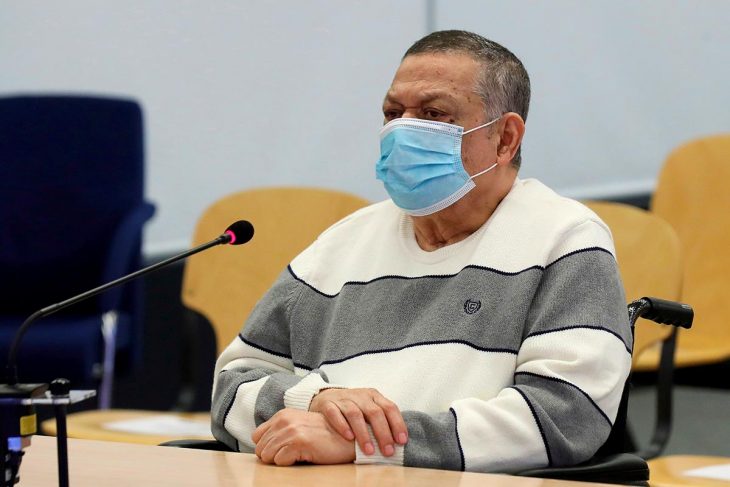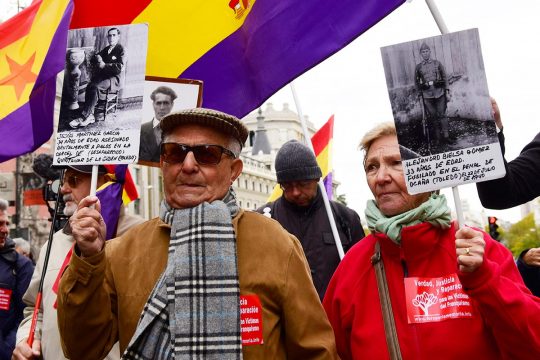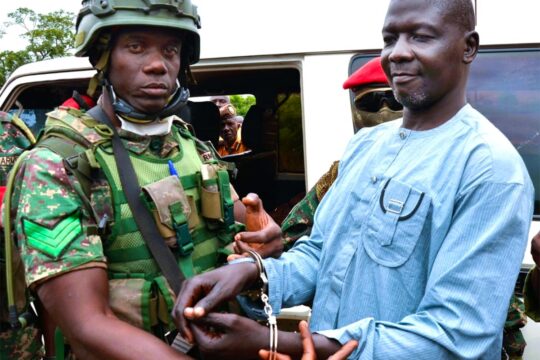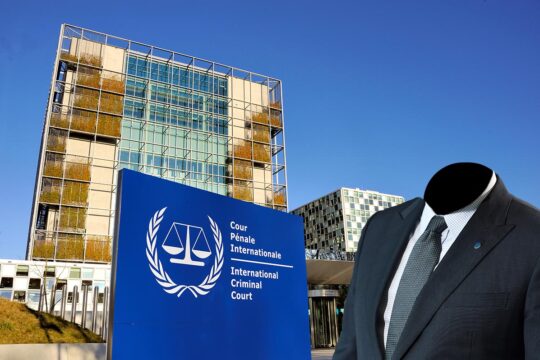Until 2014, Spain could open criminal investigations on crimes against humanity no matter where those crimes were committed in the world. The case of Inocente Orlando Montano, who was extradited to Spain from the United States in December 2017, started thanks to that principle of “full universal jurisdiction”. Since 2014, a new law says victims should be of Spanish nationality to file a suit under the Spanish jurisdiction, and the Jesuit case only “survived” because five of the six priests murdered in 1989 were born in Spain.
Montano, 77, was given the opportunity to follow the trial from his cell. But the former Salvadorian colonel chose to be present every day, sitting in his wheelchair by a table in the middle of the courtroom and listening to every word the judges and parties had to say about him. In concluding remarks his attorney asked the judges to acquit Montano or at least that mitigating measures should be applied due to his age and health condition.
An order to kill
His presence in Madrid reminds of the Cold War and the Salvadorian civil war, which lasted from 1980 to 1992, and claimed the lives of some 70,000 civilians. During those years, the military committed some 18,700 crimes, many of them in complicity with death squads, according to the 1993 final report of the Truth Commission set up in the country with assistance of the United Nations. At the time, the United States backed Salvadorian governments with the aim of preventing the ascent of communism. According to figures from the US Congress, Washington had sent over $4 billion to El Salvador by 1989 as cooperation funding.
That same year, on November 15, an order was given to soldiers of a special armed forces unit (the ‘Atlacatl Batallion´) to go to the campus of the Central American University (known as UCA), kill father Ignacio Ellacuria and leave no witnesses, according to testimony before the Madrid court. Former lieutenant Yusshy Rene Mendoza, American professor Terry Lynn Karl and priest Jose Maria Tojeira came to the bar to describe the crucial order, allegedly given during a meeting at which Montano was present. “A decision like that must have had the approval of the High Command,” said Karl, a political science professor and former director of the Centre for Latin American Studies at Stanford University. The High Command was a body composed of the then president Alfredo Felix Cristiani, the Minister of Defence and his deputy, the chief of the general joint staff and Colonel Montano, then Deputy Minister of Public Security which was one of the three highest positions in the army. According to the three witnesses, officials from the High Command and the General Staff met that day to plan the murder.
The buddies’ plot
Karl said independent investigations by Scotland Yard and the CIA, corroborated by declassified US government documents collected by the National Security Archive, an NGO, pointed to Montano’s responsibility in the Jesuit’s slaying. But the order to kill father Ellacuria had been a collective decision, she told the court. Montano was part of a group which also included head of the Joint Chiefs of Staff Colonel Rene Emilio Ponce and deputy Defence Minister Orlando Zepeda, who were known as “Los compadres” (“the buddies”), said Karl. She wrote two long reports (one in 2009 and the other in 2017) on the killings of the priests. "Just after a media campaign where it was said on a nationwide channel that the UCA Jesuits were guerrilla leaders, everyone at that meeting was more or less clear about what was going to happen. The consensus was important because the order to kill civilians was illegal,” Karl told the court.
By 1989, the population of El Salvador was tired of a decade of war. Father Ellacuria was close to president Cristiani, and he was pushing for peace, testified Father Tojeira, who was head of the Jesuit order for Central America. “If anyone in El Salvador cheered for peace, then that person would become the enemy of both military and guerrilla,” explained Tojeira during the trial. The Jesuits at UCA had received several death threats and by 1989 at least four bombs had exploded in several Jesuit facilities, according to Tojeira, who is now director of the Human Rights Institute at the Central American University.
Murders at the Jesuit residence
Witness at the trial, lieutenant Mendoza was an officer at the Military Academy when he was ordered to join 40 soldiers of the Atlacatl Battalion in their mission at the Jesuit residence inside UCA campus. He was present when at 2am on November 16 the soldiers fired at Fathers Ignacio Martin-Baro, Segundo Montes, Juan Ramon Moreno, Amando Lopez and Joaquin Lopez, killing them all. “A woman and a younger lady were also killed that night,” he told the court. 42-year-old cook Elba Ramos and her 16-year-old daughter had sought refuge at the residence due to the security situation in the capital city.
Father Tojeira explained that the residence was a short distance from strategic military facilities: 700 meters from the General Staff, 400 meters from the National Intelligence Directorate and 200 meters from a so-called Democracy Tower from where soldiers and snipers with night sights could see, according to him, what happened in the Jesuit residence. He added that the same morning he learned about the killings, he personally informed president Cristiani he had strong indications that uniformed soldiers were responsible for the crime. Tojeira said he got access to Cristiani through the Pope's representative in El Salvador. He also elaborated on his subsequent meetings with the Chief of General Staff and the deputy Defence minister. The army was trying to cover up its own responsibility, he believes, noting that one day after the slaying, the army published an obituary lamenting the killing of the Jesuits.
Tojeira also recounted the time he retired in annoyance from a meeting with military, members of a Criminal Facts Investigative Commission who he thought tried to manipulate him. “The investigation was a farce. On about December 20, 1989, I and Father Estrada, rector of UCA at the time, had a meeting with them. We told those colonels that they had to investigate the Atlacatl. But what the colonels told us was that the investigations were being carried out with polygraphs [lie detectors] on people who denounced the FMLN [guerrillas] as the murderers. They told us ridiculous things, such as that a FMLN commander was homosexual and died in that offensive, that he had told his lover that they had killed the Jesuits. Things like that. It was all a sham." “We left that meeting very upset because the Colonels had tried to manipulate us,” said Tojeira.
“I just ran administrative tasks” - Montano
After a lawsuit was filed to the special high court in Spain by the NGO Center for Justice and Accountability in 2008, 20 members of the Salvadorian Army were indicted in 2011 for their alleged responsibility in the Jesuits’ slaying. Montano was one of them. Another died the same year, his “compadre” general Ponce. A year later, El Salvador’s Supreme Court rejected the Spanish extradition request for the other military, on the grounds that they had already been tried for the same facts in 1991-1992 in El Salvador. Montano was living in the United States where the extradition request, after his lawyers had exhausted all avenues of appeal, eventually led to his transfer to Spain at the end of 2017.
“I just ran administrative tasks,” said Montano in his first statement before the Madrid court on June 9. He acknowledged he had been part of several meetings around November 15th, 1989 but denied that the one where the order was given had taken place. Also, he tried to mitigate his power as the number 3 in the army, repeating that his responsibilities were only administrative. According to Montano, strategic decisions during the war were not taken as alleged – by consensus, among the colonels – but only in the High Command. When asked by his lawyer in court what decisions he did participate in, Montano’s sideways response was: “The only decision we made in the High Command was to upgrade aggressiveness in our response by using the Air Force and artillery.” He said that neither Ellacuria nor any other priest was mentioned and that all they wanted was to recover several parts of the city held by the guerrillas at the time.
El Salvador’s judiciary called to act
The Foundation of Studies for the Application of Law (FESPAD), a body that observes the judiciary system in El Salvador, welcomes the universal jurisdiction trial which stood for ten days in Madrid last July. “This trial is a positive and emblematic contribution in order to overcome impunity for crimes against humanity and war crimes,” said the NGO on July 7, at the opening of the hearings. “We hope that our judicial system will follow this example, since it has a constitutional obligation to overcome this historical debt, reopening the judicial process to try the rest of the accused who are in El Salvador.” In 2018, when the amnesty law in El Salvador was abrogated, UCA tried to reopen the prosecution against “the compadres” and president Cristiani. The prosecution is ongoing, according to the UCA Institute for Human Rights.
For former Salvadorian president Calderon Sol, Spain has been violating El Salvador’s sovereignty by prosecuting members of its army. “25 years after peace, Spain came to reopen this. It is not fair with El Salvador. This is a judge wanting to kick national sovereignty,” he said in 2016.
*Note : The trial was entirely broadcasted. Due to the Covid19 pandemic restrictions our correspondent couldn’t fly to Madrid but followed the trial from distance.






